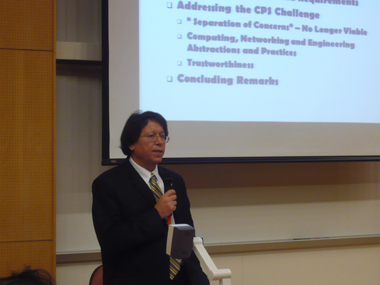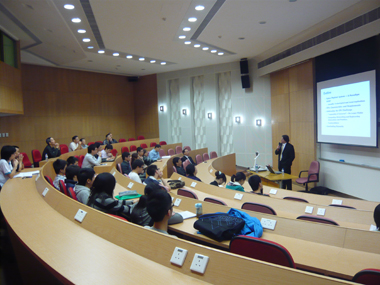A seminar on "Challenges and Research Directions in Complex Networks and Systems of the Future" holds at UM
16 Nov 2010
A seminar on "Challenges and Research Directions in Complex Networks and Systems of the Future" was organized by the Department of Computer and Information Science of the Faculty of Science and Technology, the University of Macau (UM), took place at UM on 15th November 2010.
The seminar was presented by Prof. Taieb Znati. He received a Ph.D. degree in Computer Science from Michigan State University in 1988, and a M.S. degree in Computer Science from Purdue University, in 1984. He is a Professor in the Department of Computer Science at the University of Pittsburgh, with a joint appointment in Telecommunications in the Department of Information Science, and a joint appointment in Computer Engineering at the School of Engineering. He served as the Director of the Computer and Network Systems Division at the National Science Foundation. Dr. Znati also served as a Senior Program Director for networking research at the National Science Foundation. In this capacity, Dr. Znati led the Information Technology Research (ITR) Initiative, a cross-directorate research program, and served as the Chair of ITR Committee.
Dr. Znati's current research interests focus on the design and analysis of evolvable, secure and resilient network architectures and protocols for wired and wireless communication networks. He is a recipient of several research grants from government agencies and from industry. He is frequently invited to present keynotes in networking and distributed conferences both in the United States and abroad.
Dr. Znati currently serves as the General Chair of GlobeCom 2010. He also served as the general chair of IEEE INFOCOM 2005, the general chair of SECON 2004, the first IEEE conference on Sensor and Ad Hoc Communications and Networks, the general chair of the Annual Simulation Symposium, and the general chair of the Communication Networks and Distributed Systems Modeling and Simulation Conference. He is a member of the Editorial Board of the International Journal of Parallel and Distributed Systems and Networks, the Pervasive and Mobile Computing Journal, the Journal on Wireless Communications and Mobile Computing, and Wireless Networks, the Journal of Mobile Communication, Computation and information. He was also a member of the editorial board of the Journal on Ad-Hoc Networks, and a member of IEEE Transactions of Parallel and Distributed Systems.
The seminar discussed the challenges and research directions of Cyber Physical Systems. Unprecedented advances in wireless and mobile technologies, coupled with the proliferation of social networks and applications, is paving the way for a new era of cyber-physical systems that will revolutionize the way humans interact with their physical environment. Cyber-physical systems exhibit deeply integrated computational and physical capabilities, interacting with humans through diverse modalities. The ability to interact with, and expand capabilities of, the physical world through computational means is the key technological multiplier. Realizing the vision of cyber-physical systems, however, bring about unprecedented challenges, technical and non-technical, underscoring the need for new insight and a fresh look on we design and deploy distributed cyber-physical systems. These systems are likely to exhibit complex dynamics at many spatial and temporal scales, and various levels of control. They need to be predictive, reactive to conditions and external events, and receptive to coordination and negotiation; they have. They also need to be fault tolerant and recoverable, satisfying potentially very high availability and timeliness requirements. As critical as these physical and cyber infrastructures are to our lives and diverse sectors of our society, we have little rigorous knowledge for understanding their structure and dynamics. The talk concluded the challenges and future research directions in how to effectively design robust and secure large-scale complex systems, so that we can engineer them to have predictable behaviors. Around 40 students and teachers had attended the seminar and the students actively participated and asked questions.
 Speaker Prof. Taieb Znati, Department of Computer Science at the University of Pittsburgh |
 The audiences at the seminar at the University of Macau |
